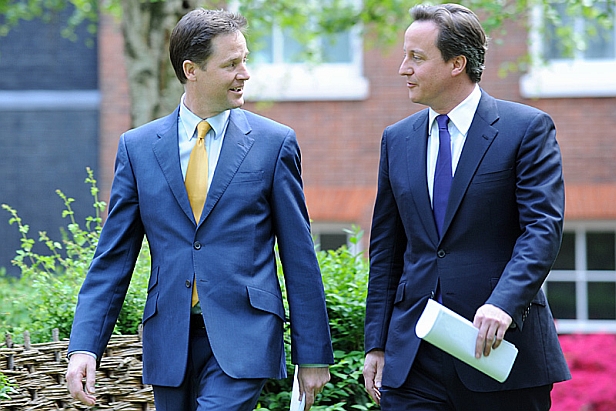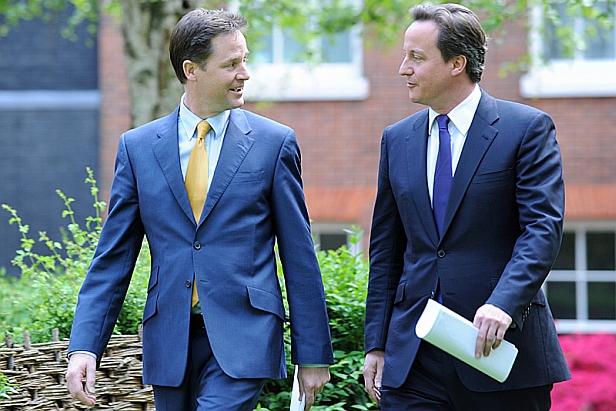 Prime Minister David Cameron (right) and deputy Nick Clegg, BFFsPrime Minister’s OfficeBritain’s got a new prime minister, Conservative David Cameron; a new deputy prime minister, Liberal Democrat Nick Clegg; and an odd new governing coalition kludged together with both of their parties. The new government has released its platform, saying “The parties agree to implement a full programme of measures to fulfil our joint ambitions for a low carbon and eco-friendly economy.”
Prime Minister David Cameron (right) and deputy Nick Clegg, BFFsPrime Minister’s OfficeBritain’s got a new prime minister, Conservative David Cameron; a new deputy prime minister, Liberal Democrat Nick Clegg; and an odd new governing coalition kludged together with both of their parties. The new government has released its platform, saying “The parties agree to implement a full programme of measures to fulfil our joint ambitions for a low carbon and eco-friendly economy.”
Items of note from the environment section:
- The establishment of a high-speed rail network.
- The cancellation of the third runway at Heathrow International Airport.
- The establishment of a smart grid and the roll-out of smart meters.
- The full establishment of feed-in tariff systems in electricity – as well as the maintenance of banded ROCs.
- The creation of a green investment bank.
- The provision of home energy improvement paid for by the savings from lower energy bills.
- Measures to encourage marine energy [wave and tidal power].
- The establishment of an emissions performance standard that will prevent coal-fired power stations being built unless they are equipped with sufficient CCS to meet the emissions performance standard.
- The provision of a floor price for carbon, as well as efforts to persuade the EU to move towards full auctioning of ETS permits.
- Measures to promote green spaces and wildlife corridors in order to halt the loss of habitats and restore biodiversity.
- Mandating a national recharging network for electric and plug-in hybrid vehicles.
- Continuation of the present Government’s proposals for public sector investment in carbon capture and sequestration (CCS) technology for four coal-fired power stations; and a specific commitment to reduce central government carbon emissions by 10 per cent within 12 months.
It goes without saying that U.K. Conservatives are in a different world than orthodox American conservatives-Cameron’s party gets the climate threat and wants to help address it. Even the items above that lack specifics are encouraging.
The most difficult issue to hammer out seems to have been new nuclear power plants, which the Conservatives support and the Lib Dems strongly oppose. Under the agreement, Lib Dem lawmakers will be able to abstain from nuclear votes. Adds the BBC, “But Lib Dem activists will not be happy with commitment to nuclear power.”
The most important item might be the pledge to try to fix up the E.U.’s cap-and-trade climate program by creating “a floor price for carbon, as well as efforts to persuade the E.U. to move towards full auctioning of ETS [emissions trading scheme] permits.”
Says Guardian columnist George Monbiot: “The government can’t act alone on either issue, but if it’s serious about this it could help turn the ETS from a useless, nobbled programme, governed by the demands of pollutocrats, into a system that forces companies to clean up. Whether you like carbon trading or not, if we’re going to have it, it’s got to work.”
“So it’s better than I had expected,” Monbiot adds. “The agreement’s environmental policies are more Lib Dem than Conservative, and more progressive than most of the other proposals in the document. Let’s see how it works in practice.”
Longtime U.K. environmental correspondent Geoffrey Lean adds some context in a Telegraph post: “[P]rioritising the environment and launching a green economy are among the few things on which [the Conservative Party] can enthusiastically agree with its Liberal Democrat partner. Indeed, David Cameron duly highlighted it as one of the main reasons the two parties could get together in his original ‘offer’ speech to the Lib Dems on Friday.”
Lean calls Cameron “incomparably the greenest prime minister — indeed major party leader — Britain has ever had.” Seems surprising, though Lean argues the bar has never been set very high. He expects the coalition to focus on incentives for households to take energy-saving measures and add renewable sources at home.
He also gives former Prime Minister Gordon Brown props for his commitment to international climate talks: “Gordon was much more Brown than green, but over the last year he did more than any other leader to try to make the Copenhagen summit work, being the first to announce his attendance, pushing others to go, and leading the crucial last minute negotiations that saved a worthwhile package from the wreckage.”



